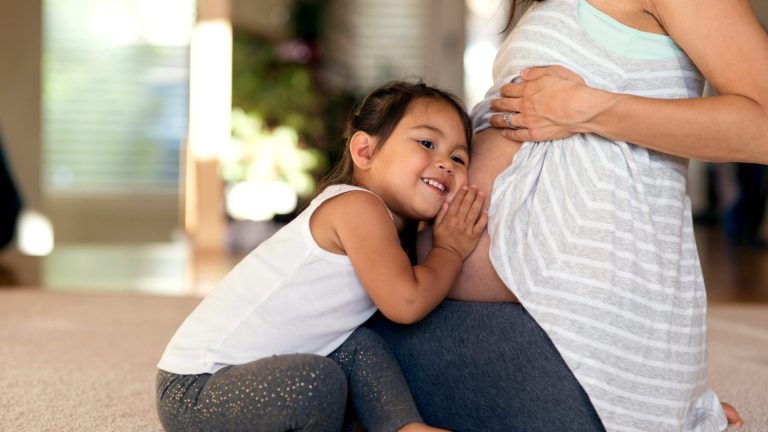Excitement is in the air, a new baby for you, a new sibling for your child. Here are some helpful ideas on how to prepare your child/ren for this change during your pregnancy and make those first few weeks after childbirth stress free for both of you.
1. When to tell a child you are pregnant
When and how to tell your child is a personal decision but there are some things you may want to consider. How old is your child? A child two or under will not notice the changes in your appearance until you are quite obviously pregnant. Children, bless them, love you as Mum and won’t really notice a growing belly until it is quite large!
This means if you choose you may wait to tell your child till quite a few months in. The advantage of this can be that the wait is not so long for a toddler with very little sense of time. If they are told at the 6 week mark, they will be expecting a new brother or sister to come soon after. Seven months can seem forever to a young child.
The only issue to consider is that your child doesn’t hear this big news from someone else. But it may work for you if you intend to tell just very close family until the 3 or 4 month mark.
An older child (especially one of school age) is more likely to notice changes in appearance or the fact that you are feeling ill or tired – for such little ears they are experts at overhearing conversations! Therefore, it might be worth considering telling them early on so they feel included and can get excited along the way.
Be prepared that once you have told your child you may as well take out a full page ad in the paper as young children will find it impossible to keep it a secret, even if asked. It’s just too exciting! When visiting families on early childhood visits through footsteps I am often told “My Mummy is having a baby” well before Mum had planned on sharing this news.
2. What to tell your child
Tell your child together as a family at a time when you are not rushed and have plenty of time to answer any of their questions. Do not expect it to be a one off event, discussions will need to take place many times over the coming months to help prepare your child. You may start with a simple “Mummy and Daddy are having a baby; you will have a new brother or sister.”
You can then be guided by their questions or response. If they have lots of questions at that moment in time, answer them. If not, just go with your child, they will ask when they are ready.
You can expect all kinds of reactions. A child who has been asking for a baby brother or sister and is exposed to younger cousins may be very excited with the prospect of a new baby. Alternatively, your child may give you very little response as they might need time to take in this information and really understand it. For many children the interest doesn’t start until a babies’ room is set up, or even until the baby is born.
Don’t be too distressed if your child is angry or upset. This is a normal and typical reaction for a child who may be feeling confused. This could mean a number of things – either jealousy i.e. but I am the special ‘baby’, or just genuine surprise.
3. How to prepare your child through play
Ensure your child has baby dolls to play with. This includes boys too! Many families don’t buy dolls for boys but we want to encourage nurturing characteristics in them too. They are going to be a big brother, and in the bigger picture perhaps a father one day. Role play and pretend play is one way children make sense of the world around them. Props such as baby baths, cots and blankets will encourage this.
Give your child praise during this play “look how gentle you are to the baby, you will be a great big sister/brother.”
Don’t be surprised if your child wants to put pillows or balloons inside their top to be pregnant too! Children mimic what happens around them to make sense of it.
Look for books about a new baby in the family either to buy or to borrow from friends or your local library. Read these together as you may find it encourages your child to talk in a relaxed way about the new baby or to feel comfortable to ask questions. Some examples of great books on this topic are:
The new baby at your house By Joanna Cole
I’m a big brother/I’m a big sister By Joanna Cole
A smile in the moon By Jenny Clay (currently out of print but may be available in libraries)
You can also use art to suggest your child draws pictures of what the new baby may look like, or cut out pictures of babies from magazines for a collage.
4. Getting used to what to expect
Your child may be expecting a baby to play with straight after the birth and can be very disappointed with this ‘boring’ new baby! You can’t fully prepare your child for what it will be like to have a new born in the house but you can do some things to prepare them.
- If possible visit a friend of neighbour with a new baby, especially in the last month of your own pregnancy. Talk about how the baby will sleep and feed most of the day.
- Get out their own baby photo album and look back at their newborn photos. Your child will love hearing their birth story and what they were like as a new baby.
- Involve your child in buying some of the babies’ things.
Should my child come to my checkups or scans?
This is a very personal decision. I had a big gap between my children, six years, so my son did come along to one of my later scans and listened to the heart beat. He loved this and I think it did make the baby more ‘real’. If you do this, you will need to take in the age of your child and their personality. If you do decide to bring them along, have a support person on hand in case they want to leave the room, get upset or ‘play up’ so you and your partner can focus on what you are there for. It is worth remembering that some appointments or scans may in fact have some unexpected news which is why a support person for your child who they trust and know well needs to come too. You can always share the DVD or print outs with them at home if you decide not to take them along.
5. Consistency and routine
These will be very important for your child through your pregnancy and in those first few weeks after childbirth. Try and keep the same routines in place as with lots of other changes your child will feel reassured if their own routine is the same.
If you give up work near the end of your pregnancy you may want to consider keeping childcare arrangements in place. You could look at reducing the days your child goes but stopping them going altogether could be disruptive and will make it harder for your child to return to care in the future. You may be very tired near the end of your pregnancy and a few days a week with a home-based provider like footsteps or at Kindergarten can be just what you need!
If the new baby means a change of bedrooms for your current child move them well before the new baby comes so they don’t think the baby has ‘taken’ their room.
6. Planning ahead
You may like to make up some play packs now which your child could play with alongside you when you are feeding the new baby. You can use ice cream containers or a draw string bag. These can then be filled with items that your child can play with minimal help. Depending on the age of the child it could be a threading game, matching cards or picture dominos or stickers and a sticker book.
Plan early and create a Care Plan for your child during childbirth and for the first few days in hospital. Have a plan B and even C too! Where possible, having someone to come into your child’s own home to care for them is best. They will feel more secure in their familiar environment.
As well as having your own bag packed, have a bag packed for your child with change of clothes, pyjama’s, comforter, a familiar book and a copy of their usual routine written out.
Accept all offers of help. Sometimes we try and be Supermums but a little help during pregnancy or in those first few weeks can make all the difference. Be specific if people ask how they can help. For example ask could they take your child to the park to play to give you a break. Or you could ask them to help settle the new baby to sleep while you give your older child some one on one time
If your child is used to Mum doing everything, your new pregnancy is a great time to get Dad’s, trusted friends or Grandparents involved. This will make an easier adjustment for your child when more of your time is taken up with a new baby
Don’t worry if there are a few hiccups along the road. It’s a big but wonderful change for all of you. Perceived negativity such as feeling of jealousy can actually be positive life lessons for your child in helping them develop empathy, consideration of others and sharing to name a few. If your child feels loved and secure within their special place in the family, they will soon love the precious new addition to the family.






